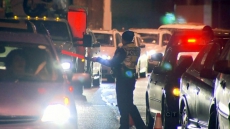Newly released court documents show Toronto police linked serial killer Bruce McArthur to three missing men with ties to the city's gay village years before he was charged with killing them and five others.
The documents, submitted to the court by officers seeking search warrants, show investigators interviewed McArthur in late 2013 as a witness in the disappearance of Skandaraj Navaratnam, Abdulbasir Faizi and Majeed Kayhan.
Police say in the documents they had found an email address for a "silverfoxx51" under deleted contacts in Navaratnam's computer and the nickname also appeared in a notepad belonging to Faizi.
The deleted contact also included a phone number that was linked to McArthur in a police database — a record related to a 2005 incident in which he was stopped for driving without valid insurance.
The email address matched that of a profile on the adult website silverdaddies.com, and the photos from that profile resembled those for a Bruce McArthur in a Ministry of Transportation database and one listed among Navaratnam's Facebook friends.
The documents say McArthur told police he was friends with Navaratnam and had a sexual relationship with Kayhan but denied knowing Faizi. He also told investigators he had learned of Navaratnam's disappearance from posters put up in the neighbourhood.
McArthur, a self-employed landscaper, pleaded guilty last month to eight counts of first-degree murder for men he killed between 2010 and 2017: Navaratnam, Faizi and Kayhan as well as Andrew Kinsman, Selim Esen, Dean Lisowick, Soroush Mahmudi, and Kirushna Kanagaratnam.
The 67-year-old was sentenced to life in prison with no chance of parole for 25 years, meaning he will be 91 before he can apply for any form of release.
In handing down the sentence, Justice John McMahon said he had not seen any sign of remorse. "Mr. McArthur would have no doubt continued to kill if he wasn't caught," he said.
The documents unsealed this week show it was only after McArthur was identified as a person of interest in Kinsman's disappearance in 2017 that investigators realized they had already interviewed him in the case of the previous missing men.
Police linked McArthur to Kinsman after security footage showed Kinsman getting into a red minivan outside his building on the day he vanished, the documents say. That van was later traced to McArthur.
An officer who had worked on the investigation into the disappearance of Navaratnam, Faizi and Kayhan recognized the name and confirmed it was the same person police interviewed in 2013.
The documents also shed more light into a 2016 incident in which McArthur was questioned after he began choking a man during a sexual encounter in his van.
The man, who is not identified, managed to escape and filed a police report. McArthur turned himself in and was questioned by Det. Paul Gauthier, who is now facing disciplinary charges in connection with the investigation and is set to appear before a police tribunal next week.
McArthur told Gauthier that because the man had expressed a desire to be pinched hard during their encounter, he believed the man "wanted it rough," the documents show.
"The investigating officer, Det. Gauthier, indicated that McArthur appeared genuine and credible in his recall of the incident," they said. McArthur was released without charges.
He was arrested in early 2018 and eventually charged in the deaths of eight men. The documents released this week were filed about a week after his arrest but before all the charges in the case were laid.
Police have faced criticism for not acting sooner on concerns from the LGBTQ community that a serial killer was behind the disappearances but Police Chief Mark Saunders has defended the work carried out by the force. Saunders said officers simply did not have enough evidence until 2017.
Court heard McArthur strangled all of his victims and then took photographs of their bodies in various states of undress, keeping the images on his computer and viewing them long after his crimes.
McArthur then dismembered his victims and hid their remains in planters at a Toronto residential property where he stored his landscaping equipment, and in a ravine behind the home.


